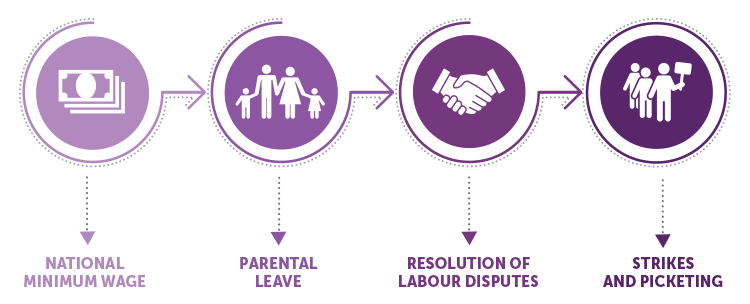New labour legislation on the cards
In summary, the bills deal with a broad range of labour issues as follows:

This article discusses these issues by using the names of the relevant Bills as headings.
National Minimum Wage Bill
The National Minimum Wage Bill, together with the Basic Conditions of Employment Amendment Bill, proposes that the national minimum wage is increased as follows:
- R3 900 per month for full-time workers (who work 45 hours per week); or
- R3 500 per month for full-time workers (who work 40 hours per week); or
- R800 per week; or
- R20 per hour.
This Bill also introduces different hourly wage rates for agricultural workers (R18 per hour) and domestic workers (R15 per hour).
The Bill creates and establishes a National Minimum Wage Commission who will be responsible for annually reviewing the national minimum wage. In deciding on the annual adjustment, the following factors will be considered:
- cost of living;
- minimum living levels;
- alleviation of poverty;
- wage differentials and inequality;
- conditions of employment;
- health, safety and welfare of workers;
- employment levels;
- inflation;
- Gross Domestic Product growth;
- state of collective bargaining.
The Basic Conditions of Employment Amendment Bill will include provisions of the National Minimum Wage Bill.
Labour Relations Amendment Bill
This Bill makes various changes to the Labour Relations Act 66 of 1995. These changes mainly concern collective bargaining. The Bill provides for the following:
- extension of bargaining council agreements to non-parties by the Minister of Labour;
- extension of funding agreements of bargaining councils;
- picketing through collective agreement or through prescribed picketing rules;
- extension of the meaning of ballot for a strike or lock-out to include a secret vote;
- creation of an advisory arbitration panel.
The advisory arbitration panel has been established to resolve strikes (or lockouts) that are obstinate or violent. The panel may also intervene if there is potential for the strike (or lockout) to cause a local or national crisis. The panel will have the power to investigate the cause and circumstances of the strike (or lockout) and release an advisory arbitration award to assist the parties in resolving the dispute. The panel may only be established if this is directed by the Minister of Labour or Labour Court.
Labour Laws Amendment Bill
The Bill aims to amend the Basic Conditions of Employment Act 75 of 1997. The Bill creates parental leave, adoption leave and commissioning parental leave to employees as follows:
- an employee, who is a parent of a child, is entitled to ten consecutive days of parental leave;
- an employee, who is an adoptive parent of a child below the age of two, is entitled to:
- adoption leave of at least ten consecutive weeks; or
- at least ten consecutive days of parental leave.
- an employee, who is a commissioning parent in a surrogacy agreement, is entitled to:
- commissioning parental leave of ten consecutive weeks; or
- at least ten consecutive days of parental leave.
Next stage of legislative process
The Bills will now be placed before a plenary sitting of the National Council of Provinces. If adopted, the Bills will be sent to the President of the Republic of South Africa for final assent and signature. Once signed by the president, the Bills will become law.
The information and material published on this website is provided for general purposes only and does not constitute legal advice. We make every effort to ensure that the content is updated regularly and to offer the most current and accurate information. Please consult one of our lawyers on any specific legal problem or matter. We accept no responsibility for any loss or damage, whether direct or consequential, which may arise from reliance on the information contained in these pages. Please refer to our full terms and conditions. Copyright © 2026 Cliffe Dekker Hofmeyr. All rights reserved. For permission to reproduce an article or publication, please contact us cliffedekkerhofmeyr@cdhlegal.com.
Subscribe
We support our clients’ strategic and operational needs by offering innovative, integrated and high quality thought leadership. To stay up to date on the latest legal developments that may potentially impact your business, subscribe to our alerts, seminar and webinar invitations.
Subscribe




